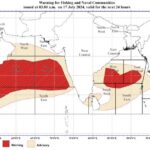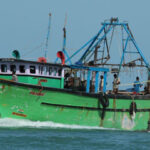The Indian Ocean is the smallest of the three major oceans in the world, but it consists of twenty-two countries in its basin, which is over a quarter of the world’s population. These countries depend on the resources of the Indian Ocean, as it ensures the country’s livelihood and provides food security. However, the over-exploitation by the countries residing in its basin results in it suffering from pollution and habitat degradation. The pivotal need to find sustainable solutions to protect the Indian Ocean to ensure human and environmental survival cannot be overstated.
The Indian Ocean provides many distinct advantages to countries situated in its basin. It plays an important role in instigating the monsoon rain, which is essential to countries that depend on agriculture and also contribute to the balancing of climate temperature.
Additionally, the ocean provides a wealth of food that local communities depend on for their survival. As per the Global Ocean Commission, the said ocean resources contribute to 5% of the world’s GDP, thereby securing jobs for a large number of people.
In the last few years, there has been an increase in the rise of sea levels and ocean acidification. This has led to a decline in coral and marine species and has also led to the extinction of certain aquatic families. It further poses an increased risk for monsoons, tsunamis, and cyclones for countries located in the region. It is due to these reasons that the United Nations recognised the sustenance of the marine ecosystem under ‘Goal 14 – Life below Water’ in its Sustainable Development Goals (SDGs) 2030 Agenda. The Indian Ocean Rim Association (IORA) in particular, also raised its views on the urgent need to take action by improving governance structures to preserve ocean resources.
The concept of ‘Blue economy’ has thereby been a trending topic that has garnered global attention. It is defined by the World Bank as the “sustainable use of ocean resources for economic growth, improved livelihood and jobs, and ocean ecosystem health”. Such an economy is, however, yet to be established.
As the Indian Ocean region consists of third world countries which are either developing or under-developed and are significantly different from one another in terms of economic growth and political stability, there has been a lack of cooperation to establish a set of common laws and principles. Therefore, although countries have included their own laws to protect the ocean, they lack the required international standards, as well as the relevant guidelines, and enforcement mechanisms.
The lack of cooperation noted previously is a complex problem, requiring a deeper analysis, and the time taken for the synergy of all these nations cannot be predicted. Hence, this means each country must work towards standardizing its national laws in relation to the protection of oceans. It is in that motive that the Road to Rights organisation is carrying out its projects.
The Road to Rights (R2R) is an international organisation that aims to empower the youth and carries out projects to educate the public on Human Rights. They also work towards implementing and achieving the SDGs in their respective countries. One of the latest initiatives taken by the Road to Rights team in Sri Lanka is ‘Sri Lanka 2030’ (SL2030).
Similar to the 2030 agenda, the organisation works to bring awareness of the 17 goals within the country. It particularly focuses on educating the public on why SDGs are applicable to Sri Lanka and presents both the positive and negative decisions taken by the government that affect each goal.
Given how social media plays an active role in the millennial generation, dedicated Instagram and Facebook accounts have been made for each goal, including Goal 14. The team hopes to develop each page to become a reliable platform where all information regarding each goal could be gathered from one place. Additionally, the respective accounts will also be a platform for local activists and businesses thereby recognising those who fight for a sustainable future.
For more information on Goal 14 and how the context in the Indian Ocean affects Sri Lanka follow us on social media.
This article was contributed by Naveera Perera





Leave a Reply